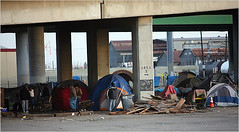
Tents under an overpass in a Fresno, California rail yard. Homelessness in Fresno has long been fed by the ups and downs in seasonal and subsistence jobs in agriculture, but the recession has cast a wider net and drawn hundreds of newly homeless.
Originally uploaded by Pan-African News Wire File Photos
By ERICA ALINI
Wall Street Journal
Economists don't see much relief for unemployed teenagers in a recession that has trimmed hires and pulled many adults into the scramble for jobs typically held by teens.
Unemployment of people ages 16 to 19 was a seasonally adjusted 23.8% in July after hitting a quarter-century high of 24% in June, the government said last week. That compared with last year's summer peak of 20.5%.
Traditional teenage jobs now draw competition, for example, from "stay-at-home moms looking to boost the family income to retirees seeking to supplement their pensions," said John Challenger, CEO of Challenger Gray & Christmas Inc., an outplacement firm.
For white teenagers ages 16 and up, July's jobless rate of 22.2% was the highest since record-keeping began in 1954; among African-American teens, it was 35.7%, nearly four times the national average of 9.4%.
Layoffs and stock-market losses have increased parents' reliance on kids' part-time jobs to help pay for ever-rising college costs. A weak youth labor market is putting "a real crimp" in Americans' ability to afford a four-year degree, said Harvard University labor economist Lawrence Katz.
The scarcity of jobs also means more middle-class teens work at jobs that fatten wallets rather than résumés.
Emily Weingart, a sophomore at Boston University, sent out about 20 applications to find a summer internship at a veterinary clinic.
But the 19-year-old, who lives in Westport, Conn., heard back from only one employer, who later turned her down because, she said, "they didn't have the resources to train someone without experience."
So Ms. Weingart spent six weeks this summer working for $7.17 an hour as a counselor at a summer camp at her hometown's Westport Weston Family Y. "It got me the hours," said Ms. Weingart, but not the experience.
In turn, when better-educated teens, like Ms. Weingart, step in line to apply for jobs at retailers or fast-food outlets, they make for strong competition for lower-income teens, Mr. Challenger said.
For these teens, a summer or part-time job is often a stepping stone to gain access to higher-skill, better-paying positions, according to Michael Gritton, executive director of Kentuckiana Works, which helps dislocated workers and needy youth find jobs in the greater Louisville, Ky., region, which also includes parts of Indiana.
Aiyana Kelley, a 15-year-old in Phoenix, found a job through a program in her city that was among recipients of $6.2 million in federal stimulus money to help local youth in need gain work experience.
Ms. Kelley got a two-month internship at the Human Services Department of Maricopa County, Ariz.; she took home her first paycheck, for $300, in June, shortly after her mother got a pay cut and the family went on food stamps.
"I've been trying to get a job since I was 14," Ms. Kelley said. "I was thrilled."
Write to Erica Alini at Erica.Alini@wsj.com
No comments:
Post a Comment